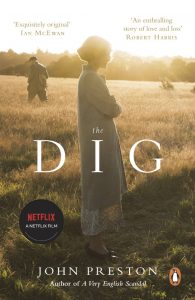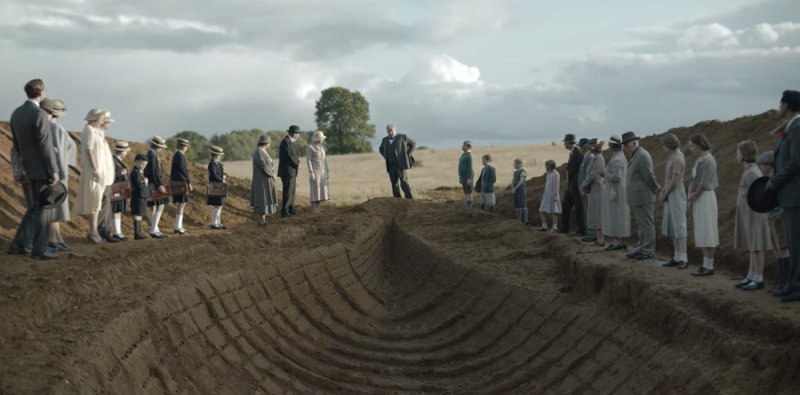The Dig, John Preston, UK, 2007
 In The Dig, Preston tells the story of the discovery and the excavation in 1939 of one of the most important archaeological finds in the UK. The mound, at Sutton Hoo in Suffolk, revealed itself to be the resting place of a ship from the Anglo-Saxon period and was eventually dated to 500-600 AD.
In The Dig, Preston tells the story of the discovery and the excavation in 1939 of one of the most important archaeological finds in the UK. The mound, at Sutton Hoo in Suffolk, revealed itself to be the resting place of a ship from the Anglo-Saxon period and was eventually dated to 500-600 AD.
The mound, one of several, was on the property of Edith Pretty, who had an intuitive feeling that it hid something of value. Initially, the Ipswich Museum oversaw the dig, with local archaeologist Basil Brown in charge of excavation. However, it did not take long for the British Museum, in the person of Charles Phillips, to push itself to the fore, realizing that the find was of singular importance. Basil Brown soon found himself replaced by Stuart and Peggy Piggott whose credentials as archaeologists were, according to Phillips, more in keeping with such a find.

I found this to be a very sad story on many levels. Edith Pretty’s young son, Robert, is a lonely, emotionally neglected, child while Edith Pretty herself is obviously ill and, possibly as a result, completely self-focused. Basil Brown has to endure the disappointment of being cast to one side just at the moment when the enormity of the dig is opening up before him. Newly-wed Peggy is desperately unhappy, and like Robert is craving some kind of emotional contact. The conflict between the two museums does not improve the general atmosphere, and on top of everything the world is about to descend into war.
Aside from the discord between the characters themselves, I found the idea of digging up something that had been hidden for so many centuries completely appalling – almost an act of vandalism. During the war, even though the dig had been covered up, the grounds of the estate were used as an army training ground, and much damage was wrought on the mounds and on the ship itself. One cannot help but wonder what was the point of it all. Is it so important to dig up treasures from a bygone time and place them in glass cases in a museum so people can file past and then say that they have seen them? Does the need to believe that one is part of something go beyond what is logical, ethical or even moral?

Although Preston can have no control over the facts he is describing, his use of first person for all main characters in the book did not work for me. I can understand why he did it, wanting to give the reader an understanding of how each character may have thought and reasoned, but it was, at times, extremely confusing.
The book has a part to play in recounting history, even if the facts are not necessarily to everyone’s liking, and from this point of view, it is worth reading.
(As you will have noted above, a film of the book has been made and is currently available on Netflix.)